What is CPA and the syllabus in CPA Course?
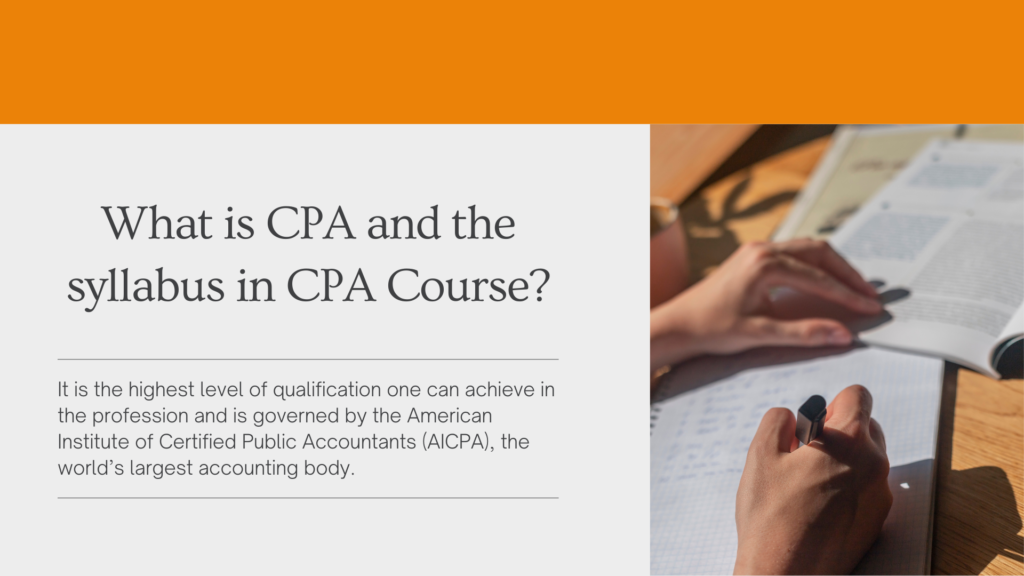
The Certified Public Accountant (CPA) designation is a globally recognized standard of excellence in the field of accountancy. It is the highest level of qualification one can achieve in the profession and is governed by the American Institute of Certified Public Accountants (AICPA), the world’s largest accounting body.
In order to become a CPA, individuals must meet certain requirements as set out by their respective state board by pursuing CPA course. These boards are all part of NASBA (National Association of the State Boards of Accountancy). These requirements include successful completion of an accredited CPA course, as well as gaining necessary experience and passing examinations set forth by each individual state board. Upon completion and meeting all criteria of CPA course, individuals will be granted a CPA license from their respective state board.
The CPA course is an extensive and comprehensive program that provides a deep understanding of the fundamentals of accounting, as well as a range of other topics including law, analytics, taxation, auditing, evaluation, regulatory frameworks and procedures, ethics, planning and management of finances.
By completing the CPA course, one gains access to a wide variety of professional opportunities in both corporate settings and public practice. CPAs are highly sought after for their expertise in areas such as analyzing financial statements, financial planning, tax preparation and other specialized areas of accounting.
Due to their extensive knowledge base and practical experience in the field of accounting and finance, Certified Public Accountants are widely respected for their ability to handle complex tasks with precision.
Syllabus of Auditing (AUD) for the CPA Course Exam
The Syllabus of Auditing (AUD) for the CPA course examination covers four distinct areas.
Area I, Ethics, Professional Responsibilities, and General Principles, accounts for 15-25% of the exam content. It is designed to ensure that candidates are aware of their professional duties and obligations as CPAs and understand the principles that guide their profession.
Area II, Assessing Risk and Developing a Planned Response, comprises 25-35% of the exam material. This section focuses on how CPAs must accurately identify and assess risk when undertaking an audit in order to develop an appropriate response plan.
Area III, Performing Further Procedures and Obtaining Evidence, makes up 30-40% of the syllabus. Here, candidates will learn how to use various audit procedures such as physical inspections, inquiries and analytical reviews to obtain further evidence in order to form accurate conclusions about their audit work.
Finally, Area IV – make 10-20% of the syllabus.
Syllabus of Business Environment and Concepts (BEC) for the CPA Course Exam
The CPA course exam’s Business Environment and Concepts (BEC) syllabus is comprised of five areas, allocating the following percentages for each: Area I – Enterprise Risk Management, Internal Controls, and Business Processes (20-30%); Area II – Economics (15-25%); Area III – Financial Management (10-20%); Area IV – Information Technology (15-25%) and Area V – Operations Management (15-25%).
Each of these areas covers a range of topics, such as identifying risk management strategies, understanding economic trends and their impact on business decisions, financial analysis, utilizing IT systems to increase efficiency, and improving operations management.
Syllabus of Financial Accounting and Reporting (FAR) for the CPA Course Exam
The Financial Accounting and Reporting (FAR) section of the CPA course exam tests candidates on their knowledge of various topics related to financial accounting and reporting. This section is divided into four distinct areas, each with a different weighting in terms of the final score.
Area I, which covers conceptual framework, standard setting, and financial market analysis, constitutes 25-35% of the total score. Area II covers select financial statement accounts and carries 30-40%, while area III focuses on select transactions and accounts for 20-30%. Finally, area IV relates to state and local government accounting, making up 5-15% of the total score.
Syllabus of Regulation (REG) for the CPA Course Exam
The CPA course exam Regulation (REG) syllabus is comprised of five distinct areas, each covering different topics and subject matter. Area I, Ethics, Professional Responsibilities and Federal Tax Procedures, comprises 10-20% of the syllabus content. Area II, Business Law, also covers 10-20%, while Area III, Federal Taxation of Property Transactions accounts for 12-22%. Moving on, Area IV on Federal Taxation of Individuals makes up 15-25% and finally Area V on Federal Taxation of Entities takes up 28-38%.
All together these five areas provide a comprehensive overview of the topics tested in the REG portion of the CPA Exam.
What does a CPA do?
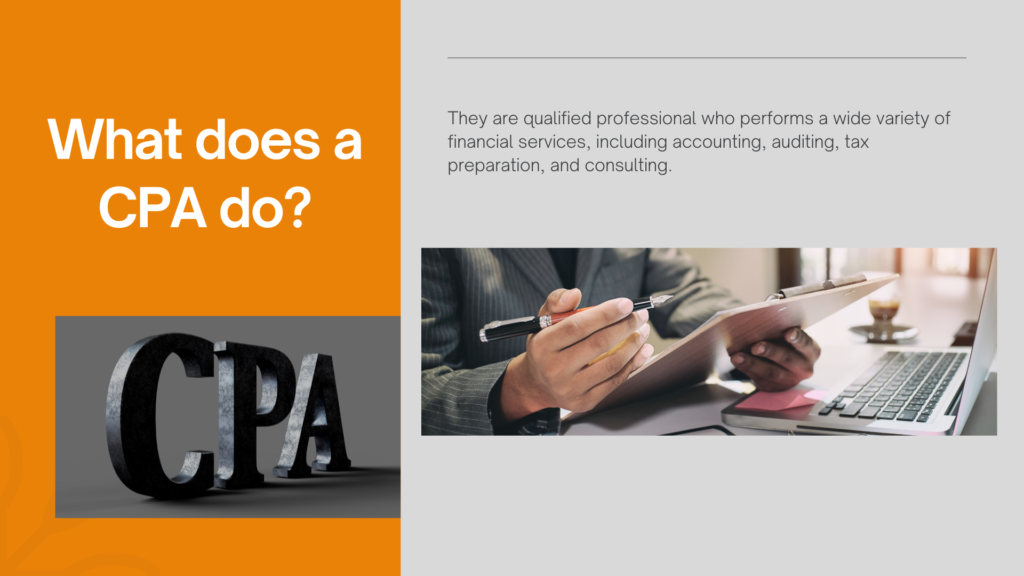
A Certified Public Accountant (CPA) is a highly trained and qualified professional who performs a wide variety of financial services, including accounting, auditing, tax preparation, and consulting. CPAs are often employed by corporations, small businesses, non-profit organizations, governments, and individuals to help them manage their financial affairs.
CPAs must have a combination of education and experience that meets the requirements for CFA course certification by the state in which they practice. Once certified after completing the CPA course, CPAs can be responsible for preparing and filing financial statements with the Securities and Exchange Commission (SEC). It is important to note that the SEC requires the use of a CPA for the preparation and filing of certain reports.
In addition to preparing financial documents and reports, CPAs also represent their clients before the Internal Revenue Service (IRS), helping them resolve any tax issues they may have. The IRS recognizes only CPAs, attorneys, enrolled agents, enrolled retirement plan agents, and enrolled actuaries as authorized representatives.
Benefits of becoming a CPA
The CPA course is the gold standard for professional accountancy and carries a great deal of prestige and respect. This can open up a host of exciting career opportunities, as well as having a direct influence on the amount of money you can earn.
The financial benefits of becoming a CPA after completing the CPA course are clear; according to Glassdoor, CPAs with one to three years’ experience in public accounting earn an average salary of $74,529 per year, compared with $57,607 per year for those without the certification.
In addition to the monetary advantages, becoming a CPA after finishing CFA course opens up many more job opportunities than would otherwise be available. CPAs can find work in public accounting firms, private companies, government agencies and nonprofit organizations. This variety allows them to explore their interests and potentially find a career path that is best suited to their skillset and ambitions.
Achieving success on the CPA course exam is an accomplishment that demonstrates to peers and employers your proficiency in accounting principles. The exam covers four sections: Auditing & Attestation; Business Environment & Concepts; Financial Accounting & Reporting; and Regulation. With an average pass rate of 52 percent among first-time test takers on all four sections combined, taking and passing the CPA course exam is a considerable accomplishment that should be celebrated.
How much is the CPA Course fee and Duration of the CPA Course?
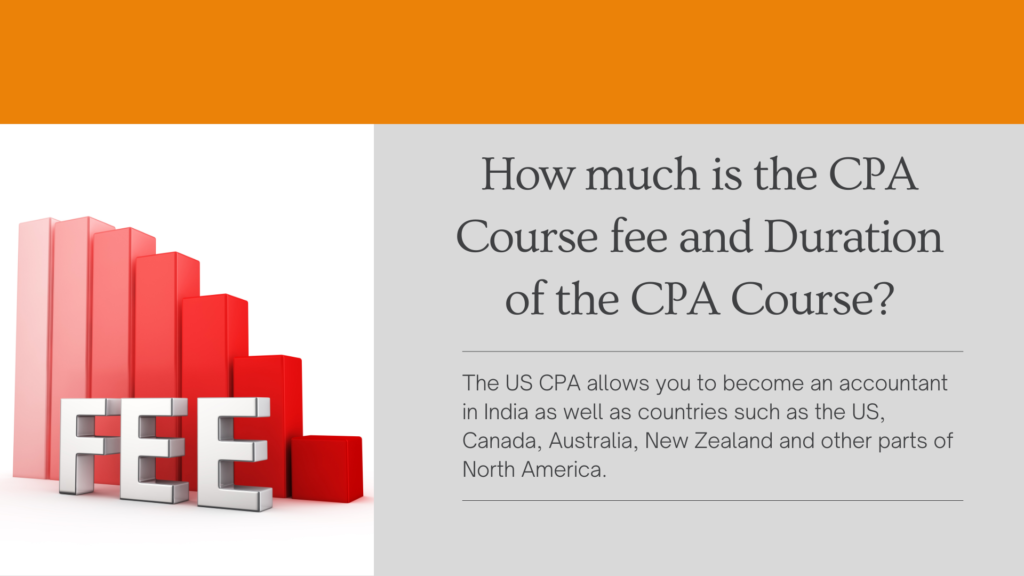
If you are looking to pursue a globally revered accounting professional qualification, then the CPA course is the perfect choice for you. The US CPA course is a professional qualification that allows you to become an accountant in India as well as countries such as the US, Canada, Australia, New Zealand and other parts of North America. This prestigious qualification is regulated by the American Institute of Certified Public Accountants (AICPA).
One of the biggest advantages of opting for US CPA course is that it will give you access to some of the most reputed accounting firms in India and across the globe. Now that students from outside of the US can also take this CFA course exam, additional costs have been introduced in order to facilitate this process.
For aspiring US CPA course professionals in India, the total cost of the course typically falls within a range of INR 3.2 to 3.6 lakhs. This figure can be further broken down into four distinct components namely: Application fees, Evaluation fees, Examination fees and Training fees. The Application fees typically range from USD 170 to USD 225 which amounts to INR 13,170 to 17,431 respectively. Further, the Evaluation fee stands at USD 225 (INR 19,365).
On the other hand, for each paper of the Examination one needs to pay a fee of USD 598 (INR 18,435). Lastly, Training fees amount to INR 1.2 Lakhs. The US CPA course, offered by the American Institute of Certified Public Accountants (AICPA), is a well-known and highly sought after qualification for those wishing to pursue Chartered Accountancy in the United States.
Compared to its Indian counterpart, which requires a minimum 5 to 6 year learning period including an obligatory 3 year articleship training, the US CPA course is significantly shorter with only four papers that can be completed within a timeframe of 1.5 to 2 years. Upon successful completion, individuals become eligible to work in US jurisdictions such as Hawaii, Guam, Puerto Rico, the Virgin Islands and the Northern Mariana Islands, making it a globally recognized and respected qualification.
What are the skills CPAs need to have?
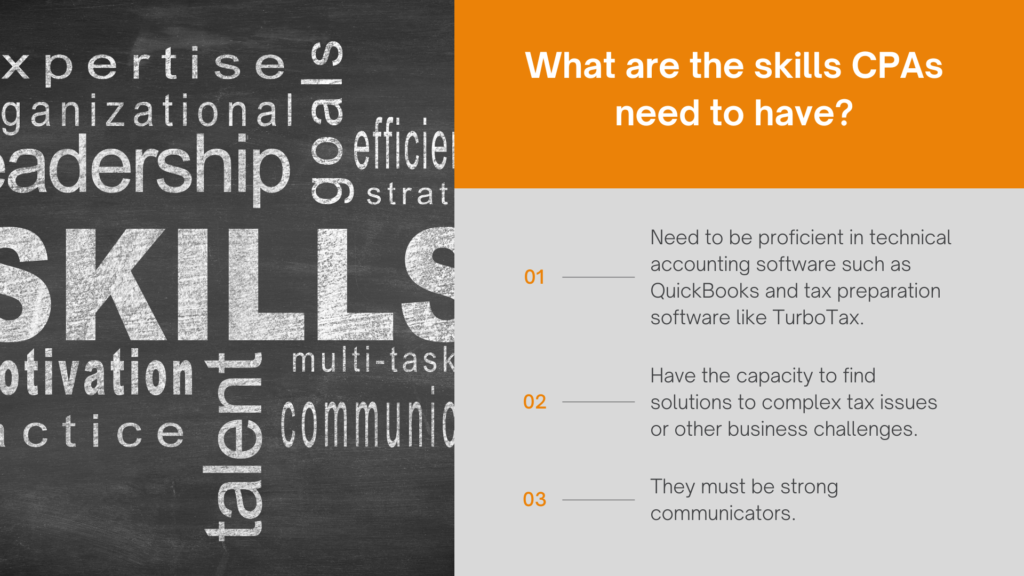
To become a Certified Public Accountant (CPA), you must possess certain essential skills for that you need to pursue CPA course. Being proficient in technical accounting software such as QuickBooks and tax preparation software like TurboTax and Drake Tax software is essential for successful CPAs. As the accounting field has evolved, having advanced technical abilities such as programming in Python and R, understanding statistical analysis, data mining, and regression have become increasingly important.
CPA’s are in the business of problem-solving, and must have the capacity to find solutions to complex tax issues or other business challenges. They must be strong communicators, both verbally and in writing, as they work with colleagues, manage employees and liaise directly with clients. Moreover, CPA’s should have a strong aptitude for attention to detail as every aspect of their work can have financial implications.
For instance, errors on a balance sheet could lead to a company losing money without their knowledge or may even result in hefty fines for false reporting. Therefore, accuracy is paramount for any successful CPA.
Eligibility to become CPA
Eligibility to pursue CPA course in the United States requires applicants to possess a postgraduate degree, preferably in Commerce, from an accredited institution. Popular degree options include membership in the Institute of Chartered Accountants of India, the Institute of Cost and Works Accountants in India, the Company Secretaries in India, a Master of Commerce degree, or an MBA. Indian CA’s with B.Com may also be accepted by some states but eligibility requirements can vary from state to state.
What are the CPA Exam Changes 2023?
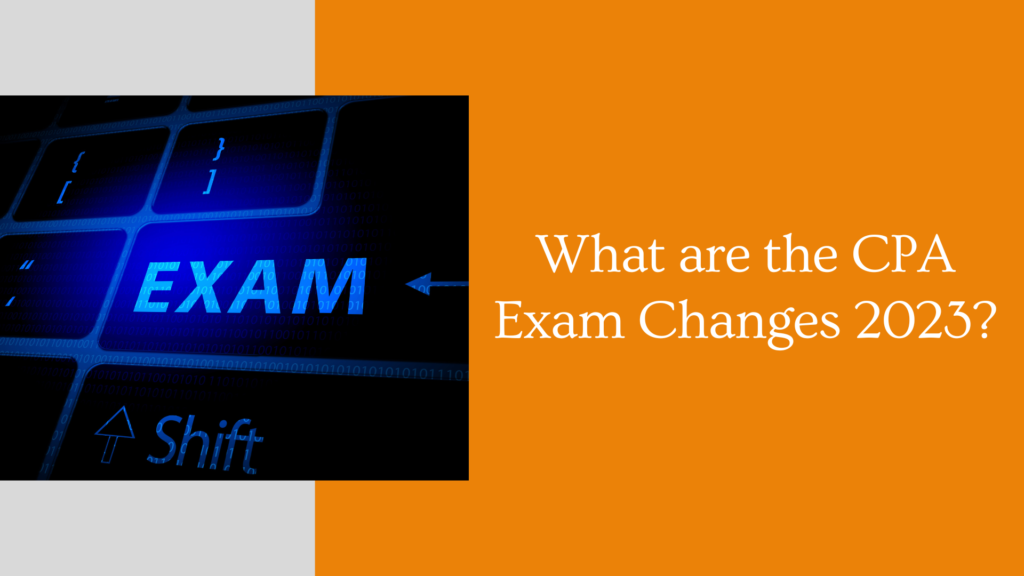
The American Institute of Certified Public Accountants (AICPA) is responsible for making changes to the CPA course exam on a yearly basis, based on changes to the profession, as well as new laws and pronouncements. These changes can involve altering existing sections, adding new topics, and occasionally removing older ones. If you plan on taking the CPA course exam in 2023, it is important to stay up-to-date with the latest announcements regarding changes made to the exam.
In this section we have broken down the most important takeaways from the upcoming CPA course exam Changes set to be eligible for testing in Q1 of 2023 into three categories – content being added, content being removed, and topics being deemphasized with a reduction in skill level required to be demonstrated.
AUD CPA Course Exam Changes – 2023
In the year 2023, a new set of changes to the AUD CPA course exam will be implemented. Specifically, the changes will be focused on SAS 142: Audit Evidence. This section aims to explain what constitutes audit evidence, and outlines the attributes of information that must be taken into account by an auditor when evaluating information that could potentially serve as audit evidence.
Moreover, it addresses how emerging technologies can be used by both preparers and auditors in this process. Additionally, it incorporates concepts surrounding professional skepticism, such as an auditor’s consideration of any susceptibility to bias that audit evidence may have and whether or not any audit evidence obtained corroborates or contradicts management’s assertions.
AR CPA Course Exam Changes – 2023
The AR CPA course exam Changes that will take effect in 2023 include the amendments outlined in ASU 2018-12 Financial Services – Insurance (Topic 944), which are designed to improve the accounting for long-duration contracts. These amendments focus on specific aspects of the guidance in Topic 944, including assumptions used to measure the liability for future policy benefits for traditional and limited-payment contracts, measurement of market risk benefits, amortization of deferred acquisition costs, and disclosures.
Furthermore, ASU 2021-08 Business Combinations (Topic 805) requires entities (acquirers) to recognize and measure contract assets and contract liabilities acquired in a business combination as outlined in Topic 606. This update helps ensure accurate bookkeeping and accounting practices when it comes to business combinations involving customer contracts.
Important 2023 Administration Dates
Aspiring CPA’s should be aware that the last day to take any of the four CPA course exam sections (AUD, BEC, FAR and REG) for the 2023 administration is December 15th. However, there will be a period of time between December 16th and January 9th, 2024 where no testing will occur due to a system conversion for the 2024 CPA course exam sections. Therefore, those planning to take their exam in 2023 should carefully arrange their testing schedule accordingly.
Additionally, candidates who are aiming to take the BEC section during the last months of 2023 have an important date to keep in mind: November 15th. This is when NASBA’s Gateway system will stop processing Authorizations to Test and Notices to Schedule for BEC, meaning that Boards of Accountancy must set first-time and reexam application deadlines prior to this date. These deadlines are not yet determined but will be published on NASBA’s website when they become available, and shared by each Board of Accountancy.
The following important dates for the 2023 Administration have been identified and should be noted: Boards of Accountancy will need to establish initial application acceptance dates for three specific areas – Business Analysis and Reporting (BAR), Information Systems and Controls (ISC) and Tax Compliance and Planning (TCP).
Applications for Audit (AUD), Financial Accounting & Reporting (FAR) and Regulation (REG) will be accepted continually, as the same codes are to be used for these core sections that will begin in 2024. However, NASBA’s Gateway system will not process Authorizations to Test or Notices to Schedule for BAR, ISC or TCP until November 22nd, 2023. Once these initial acceptance dates become available, they will be shared by each Board of Accountancy and published on NASBA’s website.
When will you get your 2023 CPA Course exam score?
Knowing when you will receive your 2023 CPA course exam score is important to help you plan your testing schedule. The AICPA typically announces the score release dates for the first half of a new year in December of the previous year, and the second half by June of that same year. Score release dates are released on a rolling basis throughout the year, so you can plan accordingly. However, it is important to remember that ALL DATES ARE SUBJECT TO CHANGE.
After sitting for a section, you can expect to receive your score on the target score release date that is provided by the AICPA. This date represents when the AICPA will send scores to NASBA, so make sure to keep an eye out for any updates or changes.
Score Release: Exam sections taken January 1 – June 30, 2023
If the AICPA receives your CPA course exam data file by January 23rd, February 14th, March 9th, March 31st, April 23rd, May 16th, June 8th June 30th then your target CPA course score release date would be as follows February 7th, February 22nd, March 17th, April 11th, May 9th, May 24th, June 16th and July 11th. Please note that if your CPA course exam data file is received after this date it will be included in the next scheduled score release.
Score Release: Exam sections taken July 1 – December 15, 2023
If the AICPA receives your CPA course exam data file by July 23rd, August 15th, September 7th, September 30th, October 19th, October 31st, November 26th, December 5th then your target CPA course score release date would be as follows August 8th, August 23rd, September 15th, October 10th, November 3rd, November 8th, December 5th and December 27. Please note that if your CPA course exam data file is received after this date it will be included in the next scheduled score release.
What is the career opportunity for CPA?

The career opportunities available after completing the CPA course for CPA are incredibly diverse, thanks to the combination of business and technical skills they gain while studying for their certification. According to recent surveys, around 70 percent of CPAs find employment in private companies, providing a range of services such as tax advice, financial consulting and auditing.
The largest employers of CPAs include the global ‘Big Four’ accounting firms: Deloitte, PricewaterhouseCoopers (PwC), Ernst & Young (EY) and KPMG. These organizations offer a wide range of services including audit and assurance services, taxation, management consulting, actuarial services, corporate finance and even legal advice. They have offices all over the world and often provide their services on an international scale.
In contrast, medium-sized firms tend to be regionalized with offices in more limited geographic areas. They usually provide similar services as larger firms but on a smaller scale; typically working with clients
The Certified Public Accountant (CPA) designation is a great starting point for a variety of career paths in the accounting field. For those who want to start their own practice, working at a local accounting firm can provide an ideal opportunity to work with smaller businesses and individuals in the area. This type of work often includes tax advice, auditing services, and other specialized services related to financial management.
For those looking for more corporate-level experience, becoming a business and industry accountant is another excellent option. Business and industry accountants are responsible for a variety of tasks within companies of all sizes, such as financial accounting and reporting, management accounting, financial analysis, and treasury/cash management. This type of role offers CPAs the chance to gain valuable experience in an ever-changing corporate environment.
CPAs work in other sectors too:
Certified Public Accountants (CPAs) are highly sought-after professionals in a variety of sectors, including government, non-profit organizations, and education. In the public sector, CPAs are employed by federal, state, and local governments to ensure that funds are allocated efficiently and ethically. Non-profit organizations also rely on CPAs to manage their financial resources responsibly. Educational institutions offer CPAs a wide range of positions in research and teaching which allow them to contribute their expertise to advancing knowledge in the field.
Specializations
Specializations are also an option for CPAs. With the right experience and training, you can specialize in areas such as:
CPAs have the opportunity to specialize in a range of different areas, each requiring unique skills and knowledge. These specializations include Business Valuation, Consulting Services (including Information Technology), Corporate Taxation, Employee Benefits, Estate Planning, Financial Forensics, Financial Statement Auditing, Forensic Accounting and Fraud Examination, International Operations and Taxation, Investment Management, IT Consulting, Litigation Support, Mergers and Acquisitions, Personal Financial Planning , Real Estate , Research and Development Tax Credits as well as State and Local Tax Incentives.
Conclusion
In conclusion, it is highly advisable for aspiring financial professionals to pursue the Certified Public Accountant (CPA) course. Doing so will provide them with the knowledge and skills necessary to succeed in the competitive world of finance and accounting, as well as increase their job prospects by providing them with a valuable credential that can open doors for new opportunities. In addition, CPAs are able to command higher salaries than their non-certified peers, making CPA certification an excellent investment in one’s career.
Frequently Asked Questions (FAQs)
The CPA course is highly valued and sought after in India, due to its recognition of individuals who have gained comprehensive knowledge and experience in the field of accounting and finance. Given India’s rapid economic growth and increasing demands for financial professionals that understand both local and global markets, there is a wealth of opportunity available for CPAs in the country.
The CPA course is an excellent career option for those seeking a stable and well-paying job. CPA opportunities are diverse, with positions available in a variety of public and private sectors, including government, banking, finance, information technology, and more.
CPA professionals are often in demand and have the potential to build long-term careers. In addition to the security of the job itself, CPA’s may also be eligible for competitive salaries and benefits packages. With proper training and education, CPA positions can lead to successful careers that are both fulfilling and financially rewarding.
When it comes to CPA course and CA course, many people want to know if one is easier than the other. The truth is that both require significant dedication and hard work to achieve success. CPA exams are typically slightly longer in duration than CA exams, meaning that candidates must be prepared for a longer testing period.
Additionally, the CPA exam places more emphasis on financial accounting and taxation, whereas the CA exam focuses more on auditing and assurance services. As such, a candidate’s background knowledge and experience may play an important role in determining which certification is best suited for their individual needs. Ultimately, both exams are equally challenging and require a great deal of focus and commitment to pass successfully.
Yes, you have the potential to successfully pass the CPA course exam on your first attempt if you remain dedicated and focused. To ensure success, create a study plan that allows you to break up your studying into manageable chunks, and be sure to review all of the necessary material in detail.
Additionally, make use of practice exams and quizzes so that you can become more familiar with the test format and question types. Utilizing these strategies can help you maximize your chances of passing the CPA course exam in your first attempt.
If you’re looking to become a Certified Public Accountant, you may be wondering which subject of the CPA course exam is the easiest. Well, it’s widely accepted that the Business Environment and Concepts (BEC) section has the highest pass rate and is thus considered to be the most straightforward of all four exams.
This course covers a range of topics such as economics, financial management, corporate governance, information systems and technology, business law, and communication – making it one of the most comprehensive yet easy-to-tackle exams for those aspiring to become CPAs.
If a candidate fails the CPA course exam 3 times, they have the option to appeal and request for their exam to be re-marked. This process can be repeated for up to three unsuccessful attempts; however, if the candidate does not pass by the third remarking attempt, they will no longer be registered in the CPA PEP program.
This means that all of their progress towards completing the program will be lost and they will need to start from scratch again if they wish to pursue their CPA.
When considering the potential for higher earnings, the answer is likely yes. With the additional educational requirements and professional certification, CPAs are held to higher standards than unlicensed accountants. As such, they tend to command higher salaries and greater job security.
In addition, in many cases, employers may prefer candidates with CPA course credentials over those who only have a bachelor’s degree. Therefore, if you are looking to increase your earning potential and job security in the field of accounting, pursuing a CPA may be your best bet.
If you’re looking for an efficient and flexible way to prepare for the CPA course exams, online studying may be the right option for you. There are several ways to pursue CPA training online, such as enrolling in a degree program that offers specialized courses in accounting or taking individual preparatory courses offered by a variety of accredited universities.
These courses provide comprehensive instruction on topics related to the CPA exams, including auditing and assurance services, financial accounting and reporting, regulation, and business environment and concepts. Additionally, many of these programs offer virtual resources like study materials, practice tests, and video lectures that allow for self-paced learning.
Before taking the CPA Exam, it is important to know if a calculator is allowed. Fortunately, the answer is yes! Not only are calculators allowed, but Prometric Centers – which are the locations at which individuals take the CPA Exam – will provide pens, paper, and calculators for use during the exam.
Therefore, you will only need to bring your Passport and National Test Score (NTS) along with other valid forms of identification to gain entry into the Prometric Center – no additional materials are necessary.
Becoming a CPA without an accounting degree is possible and may be the right choice for many professionals interested in the accounting field who have majored in another area. While it is challenging to define this type of non-traditional CPA Exam candidate directly, a traditional one could be described as a recent college graduate with a degree in accounting (or a related field) seeking or starting in their first professional position.





